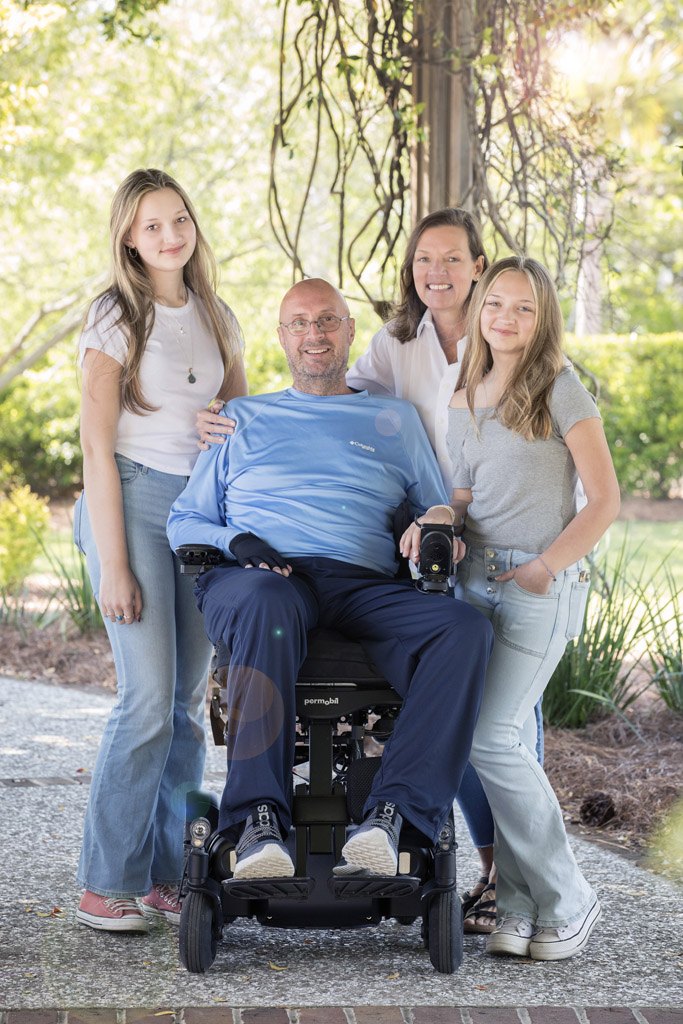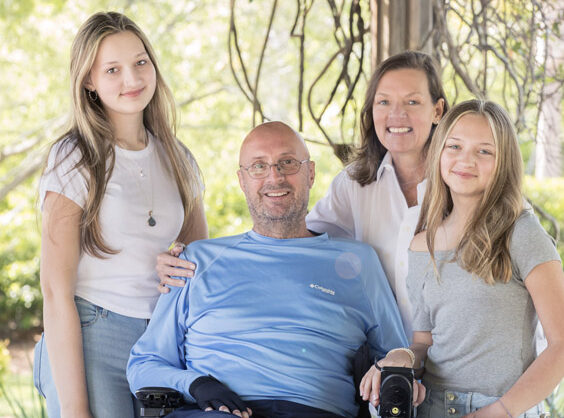Gary Pratt didn’t think much of it at first. Returning home from a gig in January of last year, he noticed that his right hand was feeling a little fatigued. Not numb. Not hurt. Just tired. He noticed that it had been harder than usual over the past few weeks to play the guitar that has been the source of his livelihood for years.
When you play as much as Gary does – in bands from Lowcountry Boil to JoJo Squirrel and the Home Pickles, not to mention solo gigs – a little fatigue is bound to happen. As a part of the island’s cadre of hard-working musicians, running a gauntlet of nightly gigs in a variety of bands and at a variety of venues, he figured it was just all part of the job.

The Pratt Family (Abbey, Gary, Connie and Mallory) is photographed at Shelter Cove Veteran’s Park in April.
His wife, Connie, wasn’t so convinced. “I’m a nurse, so I started asking all of the questions,” she said.
The problem was where to start? Believing that he might have strained something in his neck, stressing the nerves leading to the hands, the Pratts consulted a chiropractor, who ran full X-rays. A spine specialist at Optim Orthopedics recommended Gary undergo physical therapy and undergo an electronystagmography (ENG) test.
“I was doing physical therapy and it wasn’t really working, so I ended up seeing a neurologist and had an MRI done,” Gary said. It was during one of these appointments that Gary and Connie first noticed a developing twitch between his thumb and index finger.
“I had never noticed that before. When the neurologist saw that, he said it was definitely neuromuscular,” Connie said. In listing possible conditions, the first one the doctor mentioned was ALS, something that Connie admits “freaked us out.”
The neurologist referred the Pratts to MUSC, but there was one issue. “This was March, and at that time, the earliest appointment they had was June.”
Undaunted, Connie called MUSC every day looking for a cancellation, knowing that they could drop everything and be there in hours. Her persistence paid off, and they were able to sneak into an appointment on April 12. Gary would have to eat the tickets he’d been able to get to take his daughter to see Taylor Swift on April 13, but even the most ardent Swiftie would probably understand.
The couple met with Dr. Katherine Ruzhansky at MUSC, who led Gary through a battery of tests, eliminating possibilities as she went.
“We’d done all the other tests, like blood tests to check for Lyme disease. After a physical exam she told us, ‘ALS is a diagnosis by rule out, and we’ve ruled everything else out. The good news is, we caught it early,’” relayed Connie.
“Good news” is a relative term when it comes to ALS. There are treatments for the disease, and Gary follows two of them. One has a 10% chance of slowing the disease. The other extends the life expectancy of the patient by a year. While some patients can live as much as a decade after diagnosis, the average life expectancy of a patient following an ALS diagnosis is two to five years.
“He’s doing much better than I am,” Connie said. “He has a very strong faith in God, and either the miracle happens or it doesn’t.”
Waiting for the Miracle
Until that miracle arrives, the Pratts don’t need to wait alone.
There is a massive support network dedicated to the unique challenges an ALS diagnosis poses – not just to the patient, but to their family. Wendy Barnes is a huge part of that network. As a social worker with the ALS Association, her job is to provide whatever support and services are needed to meet any bump in the road.
“Our goal is to make ALS livable until we can find a cure,” Barnes said. “These families are just amazing. They are great advocates for themselves. … Each day can bring new challenges to them, and it helps just knowing that our team and I are just a phone call away, to be that person for them. … It’s such a tough disease to maneuver through.”
Barnes, who had been a social worker for decades before starting an ALS support group in 2000 and eventually joining the ALS Association full-time, made the move to Hilton Head Island just a few years ago. She arrived just in time to be that person for the Pratts.
“My role is to answer questions, connect them with resources, provide support and sometimes to just check in,” Barnes said.
The Pratts have also found an ally in Bob Scannell, another islander affected by ALS. In Scannell’s case, it was his wife, Beth, who was diagnosed in March of 2020. She passed in 2022, but Scannell continues to honor her memory. His commitment is manifest in the support he continues to offer to families like the Pratts, and in the work he has done to educate doctors on the ease of misdiagnosing ALS.
“I’ve come across research that says well over 50% of ALS patients get misdiagnosed. It’s a diagnosis of elimination, but there are things that don’t add up and that’s what doctors need to look out for,” Scannell said. “Gary was relatively lucky in that he was diagnosed quickly. But at least a third of patients end up having surgeries that either don’t help or worsen the root problem of ALS.”
To that end, Scannell hit the road, putting hundreds of miles on his car as he traveled first to an orthopedics conference in Long Beach, California, then to a conference for physical therapists in Boston, where he set up informational booths showing doctors the signs of ALS they might not be looking for.
Between those two sites, and on the long circuit around the country from the Lowcountry, he stopped at doctors’ and dentists’ offices along the way, distributing flyers.
“One of the first stops I made was at a dentist’s office in Fort Valley, Georgia,” Scannell said. “I explained what I was doing, and when I was done the dentist told me she’d been practicing for nearly 30 years and had never been exposed to this. She had never heard you could detect ALS through a dental exam.”
According to Scannell, even most of the physical therapists he spoke with hadn’t been trained to detect the disease. “I can’t necessarily blame them; it’s a difficult disease to diagnose,” he said. “And there is a huge upside in making the diagnosis early. For a lot of people, when you get that diagnosis the only thing you have to hang your hope on is getting into a clinical trial.”
Getting diagnosed early enough to get into a clinical trial, as Gary has, can make a tremendous difference, but it’s not easy. “My wife hoped to get into one,” Scannell said. “The problem is, many clinical trials have an exclusion criterion of 18 months from the onset of symptoms. Not even a diagnosis, just symptoms.”
Essentially, if it’s been longer than 18 months, a patient might be unable to access the advanced care a clinical trial can offer. Narrowing that window from symptoms to diagnosis is what keeps Scannell fighting.
“Even after my wife passed, I’ve stayed in it,” he said.
Want to help Gary? Buy his truck! “We were a two minivan family for a long time,” Connie said. “When we got to a point that Gary could get a nice manly truck, he was excited.” That manly truck is now for sale, as Gary transitions to a wheelchair-accessible van. But not just anybody is going to earn the right to buy this pimped-out 2016 Toyota Tundra with just 67,000 miles on it. “It’s a mack daddy truck. They have to promise they’ll love the truck like he loves the truck,” Connie said. “It can’t just be a work truck.” Think you have what it takes? Email Pratt.Connie@gmail.com.
The Community Comes Together
During an interview, Connie does most of the talking these days.
Gary, apart from being a naturally more private person, has started to experience the effects of the disease on his voice, making speech harder and harder. It’s a relatively new development in the disease’s progression, but one that the couple is already seeking to address through speech therapy.
That’s part of their proactive stance on Gary’s health, taking them cross-country to consult with five different neurologists.
“We know the diagnosis and we know the prognosis, but we want a team that’s upbeat,” Connie said. She points to doctors like Dr. Richard Bedlack at the Duke University ALS clinic and Dr. Tina Chu with Pfizer as standard bearers for optimistic care.
“We’re also working with Brett Stohrer (with Hilton Head Natural Medical Center),” Connie said. “He has this Category 4 laser and we’ve been doing these laser treatments to heal his muscles. A doctor in Florida who had been diagnosed with ALS has been doing them and hasn’t seen progression of his disease in nine years.”
As a fan of Pratt’s music, Stohrer has been generous in donating both his time and his services to helping out during this gut-wrenching time. But he is far from the only fan to chip in. The folks at Big Bamboo, who have given Gary a stage for decades going back to the heyday of Silicone Sister, staged a fundraising concert series that brought together the island’s most popular acts in support of their brother in music.
“We’ve had help from the community every step of the way,” Connie said. “Hilton Head Community Church has been amazing. They did a fundraiser as well, and our pastor has been coming over weekly to visit and pray with us.”
When the couple needed to move somewhere more wheelchair-accessible than their towering Victoria Bluff home, Connie’s mom helped locate a ground floor house in Carolina Isles. Their daughter Abbey launched a GoFundME which has raised, at press time, north of $56,000. Gary’s brother Stephen launched another to send the family on a vacation.
And benefactors from across the community helped make their new house a home, donating a power wheelchair and lifts.
“We’re definitely feeling the love from the community,” Connie said.
“I’m kind of a private person, so just going out in a power wheelchair was pretty uncomfortable at first,” said Gary. “But then you realize that people don’t look at it that way. They’re your friends. They’re there to help you.”
But then, that’s what we do. We as a community, we take care of our own. Especially when the person needing help is someone who has made a career out of making our lives more enjoyable. If you’ve been around long enough, you’ve seen him play. And if you’ve seen him play, you understand why this community has rallied around him.
And if you’re ready to join the community in rallying around him, check out the sidebars to this story to learn how.
Want to help Gary? But don’t need a truck? Just walk!
Hilton Head Island Student Government and Island Rec Center will host a Walk-A-Thon to benefit Gary Pratt from 9 a.m. to noon May 11 at the school’s track. The registration fee of $15, plus sales of $12 “Rock out for Gary Pratt” T-shirts will go toward helping Gary and his family meet the financial challenges of living with ALS.
Register at islandreccenter.org/als.



